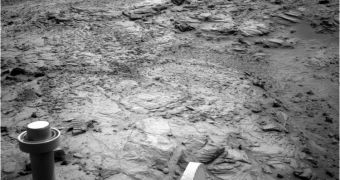It's no longer a secret to anyone that water once existed on the surface of the Red Planet. Extensive analysis from rovers, landers and orbiters has made that abundantly clear. But while experts agree on that, they continue to debate on whether the planet was a warm world, or if the freezing temperatures it currently exhibits have been the norm there since Mars appeared. It is known that its atmosphere was a lot thicker in the past, right about the time when liquid water persisted on its surface.
Generally, it tends to get very cold on our neighboring planet. The mean temperature there is around minus 67 degrees Fahrenheit, or minus 55 degrees Celsius. The hottest temperature ever recorded was 68 degrees F (20 degrees Celsius), but the lowest has yet to be decided upon. Whenever things heat up on Mars, its water transform directly from ice to gas, skipping the liquid phase. This happens on account of the low atmospheric pressure the place has. However, the water can generally be found as ice, in rock-hard blocks. Most of it has been found in ice packs at the planet's poles.
Given the large number of water-shaped landscape features on Mars, one can easily assume that the surface had liquid water on it 3.5 to 4 billion years ago. But there are only two ways this could have happened. Either the water was salty, or the temperatures were high. A general consensus exists between scientists, who agree that the amount of salt needed to keep water liquid far exceeds likely Martian concentrations. They say that, most likely, the planet was kept warmer by its thick atmosphere. This makes sense regardless of the fact that the Sun was colder back then, which would have otherwise meant that the Red Planet itself must have been colder. There are other methods of heating Mars other than sunlight, experts admit.
Explaining how global warming may have kept Mars warm in its early days is difficult, however. The planet is smaller than Earth, and its atmosphere is very different from our own. As such, researchers believe that it would have been a lot more difficult for greenhouse gases to accumulate, and trap heat. “We've spent 30 years on the greenhouse effect and no one has solved the problem in a credible way so far. On the greenhouse problem, we're just drifting into deeper and deeper complexity,” said University of Colorado expert Brian Toon, speaking recently at a NASA Astrobiology Science Conference. The event was held in League City, Texas, AstrobioNet reports.

 14 DAY TRIAL //
14 DAY TRIAL //